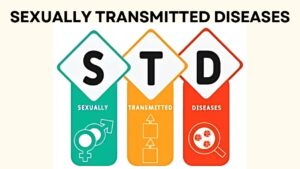
Sexually transmitted diseases (STDs) are infections that are usually spread through sexual contact, including vaginal, anal, and oral sex.
These infections can be caused by bacteria, viruses, or parasites, and can have serious health consequences if left untreated. It is crucial to be aware of the symptoms, seek early diagnosis, and receive prompt treatment from a specialist in order to effectively manage and prevent the spread of STDs.
Symptoms of STDs can vary depending on the type of infection and the individual’s immune response. Some common symptoms of STDs include:
1. Unusual discharge: Abnormal discharge from the penis, vagina, or anus is a common symptom of STDs such as gonorrhea, chlamydia, and trichomoniasis. The discharge may be yellow, green, or bloody and may have a foul odor.
2. Genital itching or irritation: Itching, burning, or discomfort in the genital area can be a sign of an STD such as genital herpes, pubic lice, or scabies.
3. Pain or burning during urination: Pain or a burning sensation while urinating can indicate a urinary tract infection, which can be caused by an STD like gonorrhea or chlamydia.
4. Genital sores or ulcers: Painful sores, blisters, or ulcers on the genital area may be a symptom of STDs such as herpes, syphilis, or chancroid.
5. Pelvic pain: Pain in the pelvis or lower abdomen can be a symptom of pelvic inflammatory disease (PID), an infection of the female reproductive organs often caused by untreated STDs.
6. Rash: Some STDs, including syphilis and HIV, can cause skin rashes or lesions on the body. It is important to note that some STDs may not cause any noticeable symptoms, especially in the early stages. This makes regular testing an essential part of maintaining sexual health, especially for individuals who are sexually active or engage in high-risk behaviors.
Diagnosing STDs typically involves a combination of medical history, physical examination, and laboratory tests. During the consultation, a specialist will ask about the patient’s sexual history, symptoms, and any potential risk factors for STDs. A physical examination may be conducted to check for any visible signs of infection, such as sores, rashes, or discharge.
Laboratory tests are commonly used to diagnose STDs. These may include:
1. Blood tests: Blood tests can detect antibodies or genetic material of STDs such as HIV, syphilis, and herpes.
2. Urine tests: Urine samples can be tested for STDs like gonorrhea and chlamydia.
3. Swabs: Swabs taken from the genital area, throat, or rectum can detect infections such as gonorrhea, chlamydia, and syphilis.
The type of test required will depend on the suspected infection and the symptoms present.
It is important to be honest and forthcoming with the specialist during the consultation to ensure an accurate diagnosis. Early treatment for STDs is essential to prevent complications and reduce the risk of spreading the infection to sexual partners.
Treatment for STDs may vary depending on the type of infection but often involves a course of antibiotics, antiviral medication, or other prescription drugs.
In some cases, such as viral infections like herpes or HIV, treatment may focus on managing symptoms and reducing transmission risk.
It Is important to follow the specialist’s treatment plan precisely and complete the full course of medication as prescribed.
Even if symptoms improve or disappear, stopping treatment prematurely can allow the infection to return or become resistant to medication.
Seeing a specialist for STD treatment offers several advantages. These specialists have specialized training and expertise in managing sexually transmitted infections, allowing them to provide the most effective and up-to-date treatment options.
They can also offer counseling, support, and education on safe sex practices to prevent future infections. Specialists in sexual health, such as genitourinary medicine (GUM) specialists or infectious disease specialists, are well-equipped to provide non-judgmental and confidential care.
They understand the sensitive nature of STDs and can offer a safe and supportive environment for patients to discuss their concerns and receive appropriate treatment.
In addition to seeking early treatment from a specialist, prevention is key in reducing the transmission of STDs.
Practicing safe sex by using condoms consistently and correctly can help lower the risk of contracting or spreading infections. Regular testing, especially for individuals with multiple sexual partners or who engage in high-risk behaviors, can also help detect infections early and prevent complications.
In conclusion, sexually transmitted diseases are serious infections that can have significant health implications if left untreated.
Recognizing the symptoms, seeking prompt diagnosis from a specialist, and receiving early treatment are crucial steps in managing these infections effectively.
If you suspect you may have been exposed to an STD or are experiencing symptoms, do not hesitate to seek medical advice from a specialist.
Remember, early detection and treatment can make a significant difference in your health and well-being. Stay informed, practice safe sex, and prioritize your sexual health.